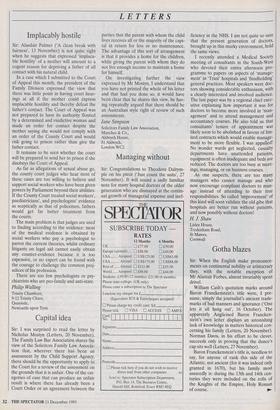Managing without
Sir: Congratulations to Theodore Dalrym- ple on his piece Oust count the suits', 27 November). It will sound a sadly familiar note for many hospital doctors of the older generation who are dismayed at the contin- ual growth of managerial expense and inef- ficiency in the NHS. I am not quite so sure that the present generation of doctors, brought up in this murky environment, hold the same views.
I recently attended a Medical Society meeting of consultants in the South-West who devoted their entire afternoon pro- gramme to papers on aspects of 'manage- ment' in 'Trust' hospitals and lundholding' general practices. Most speakers were doc- tors showing considerable enthusiasm, with a clearly interested and involved audience. The last paper was by a regional chief exec- utive explaining how important it was for doctors to become more involved in 'man- agement' and to attend management and accountancy courses. He also told us that consultants' tenure of appointment was likely soon to be abolished in favour of lim- ited contracts which would enable manage- ment to be more flexible. I was appalled! No wonder wards get neglected, casualty departments have unattended patients, equipment is often inadequate and beds are reduced. The doctors are too busy at meet- ings, managing, or on business courses.
As one suspects, there are too many managers who cannot manage and who now encourage compliant doctors to man- age instead of attending to their true responsibilities. So called 'improvement' of this kind will soon validate the old gibe that hospitals are better run without patients, and now possibly without doctors!
H. J. Shaw
Lislee House, Tredenham Road, St Mawes, Cornwall


































































 Previous page
Previous page